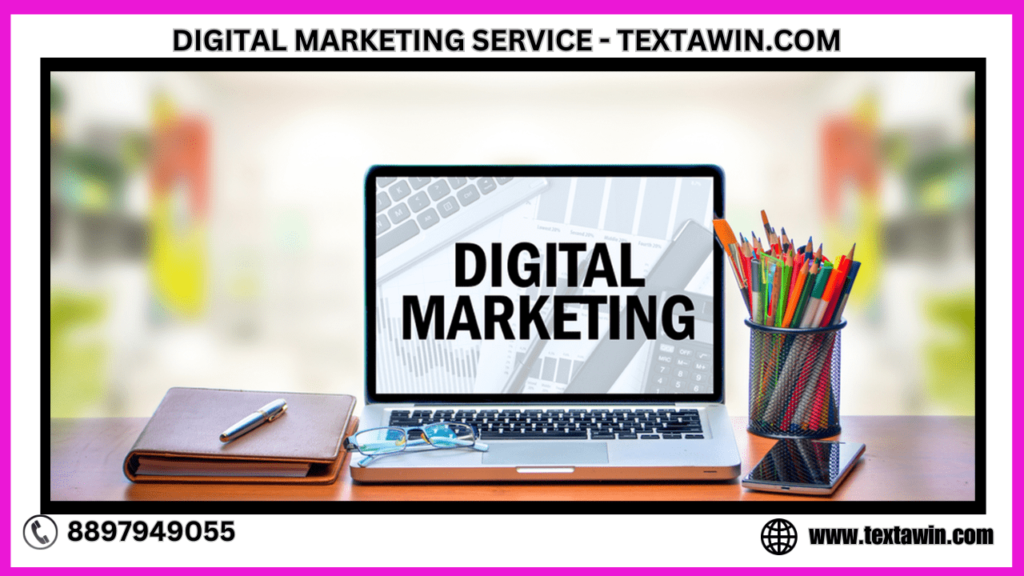What is Digital Marketing
All marketing initiatives that make use of electronic devices or the internet fall under the umbrella concept of “digital marketing.” In order to connect and interact with potential consumers, it uses a variety of online channels, including social media, email, websites, mobile apps, and search engines. In today’s digital context, digital marketing seeks to promote businesses, goods, or services, raise exposure, drive traffic, generate leads, and eventually boost sales and revenue.

Why use Digital Marketing
Increases Reach: Digital platforms give businesses access to a global audience and enable them to engage with potential clients beyond national borders.
Targets Particular Audiences: Digital marketing makes it possible to target audiences precisely based on their habits, interests, and other characteristics. This guarantees that the proper individuals receive messages at the appropriate moment.
Provides Cost-Effectiveness: Digital channels frequently offer more cost-effective solutions in comparison to traditional marketing approaches, making them accessible to companies of all sizes, including startups and small businesses.
Delivers Measurable Outcomes: Digital marketing provides firms with the ability to monitor return on investment (ROI) and adjust plans based on real-time insights into campaign effectiveness through the use of sophisticated analytics and tracking tools.
Facilitates Personalization: Digital platforms make it possible to provide customized messages and engage customers in a more personalized way, increasing engagement and loyalty.
Encourages Two-Way Communication: Digital marketing promotes two-way communication between companies and their clients, which cultivates engagement, forges bonds with them, and builds brand loyalty.
Adapts to Changing developments: Businesses may swiftly modify their plans in response to market developments, client preferences, and technical advancements thanks to digital marketing’s agility and adaptability.
Types of Digital Marketing
Search Engine Optimization (SEO):
Search Engine Marketing (SEM):
Social media marketing (SMM):
Social media Optimization (SMO):
Email marketing:
Affiliate Marketing:
Influencer marketing:
Mobile marketing:
Video marketing:
Remarketing and retargeting:
Search Engine Optimization (SEO): SEO is the process of making a website more visible and highly ranked on search engine results pages (SERPs) through natural optimization.
Search Engine Marketing (SEM): SEM is the process of employing paid advertising, such as pay-per-click (PPC) advertising, to raise a website’s exposure on search engine results pages.
Social media marketing (SMM) :is the process of advertising goods, services, or content on social media sites in an effort to boost visibility for brands, encourage interaction, and produce leads or sales.
material marketing is the process of producing and disseminating worthwhile, timely, and consistent material in order to draw in and hold on to a specific audience and encourage profitable consumer behavior.
Email marketing: Email marketing is the practice of promoting goods, services, or events, nurturing leads, and cultivating client relationships by sending promotional emails to a specific audience.
Affiliate Marketing: Affiliate marketing is collaborating with other companies or people (affiliates) to market your goods or services in return for a cut of each lead or sale that is brought about by their efforts.
Influencer marketing is the process of working with social media influencers to market goods, services, or brands to their audience and following.
Mobile marketing: Using strategies including location-based marketing, SMS marketing, mobile apps, and mobile-optimized websites, mobile marketing aims to connect and interact with consumers on mobile devices.
Video marketing is the process of producing and disseminating videos in order to advertise goods, services, or brands, boost interaction, and increase website traffic and conversion rates.
Remarketing and retargeting: These strategies utilize email marketing or display advertising to target consumers who have already interacted with a website or app in an effort to re-engage them and boost conversions.
Benefits of Digital Marketing
Global Reach: By removing geographical restrictions and increasing market reach, digital marketing enables companies to connect with a worldwide audience.
Targeted Advertising: Businesses may reach particular demographics, interests, behaviors, and places with precise targeting options, ensuring that messages are delivered to the most relevant audience.
Cost-Effectiveness: Compared to traditional advertising approaches, digital marketing offers a number of cost-effective channels, including social media, email, and search engine marketing, that enable organizations to achieve notable results with lesser costs.
Measurable Outcomes: Digital marketing gives companies access to powerful analytics and tracking tools that let them monitor important metrics, evaluate campaign performance in real time, and adjust tactics to achieve better outcomes.
Enhanced Brand Awareness: By utilizing a variety of online platforms, digital marketing raises brand awareness and exposure, assisting companies in remaining at the forefront of their target market and differentiating themselves from rivals.
Increased Interaction and Engagement: Digital marketing promotes customer engagement and interaction via email, social media, and other channels, cultivating relationships, establishing credibility, and generating brand loyalty.
Improved Customer Targeting: Digital Marketing enables businesses to understand customer preferences, behaviors, and needs through data analysis, allowing for personalized communication and tailored marketing messages. Greater Conversion Rates: With targeted advertising and personalized communication, Digital Marketing increases the likelihood of converting leads into customers and driving sales and revenue. Adaptability and Flexibility: Digital Marketing is adaptable and flexible, allowing businesses to quickly adjust strategies based on market trends, customer feedback, and performance metrics.
How much money pay for Digital Marketing?
Advertising Platform: The price of various digital marketing platforms varies. For instance, the price structures for advertising on Facebook, Instagram, LinkedIn, Twitter, and Google Ads may differ.
Ad Format: The type of advertisement you select can have an impact on how much digital marketing costs. Pricing models and rates may vary for various ad formats, such as cost-per-click (CPC), cost-per-thousand-impressions (CPM), cost-per-acquisition (CPA), and pay-per-click (PPC).
Target target: The cost of digital marketing may be affected by focusing on a particular target depending on their geography, interests, habits, and demographics. Broader campaigns with less precise targeting may be less expensive than highly targeted ones.
Campaign Objectives: The cost of your digital marketing campaigns may be influenced by the objectives you set for yourself, such as lead generation, website traffic, brand awareness, or sales. To attain desired results, some objectives could demand a greater investment than others.
Competition: The degree of rivalry among your target audience for advertising space may have an impact on the price of digital marketing. more advertising expenses could result from more competition, particularly during busy seasons or times.
Ad Budget: The whole amount you spend on advertising for digital marketing will ultimately depend on your ad budget. You can increase the reach, frequency, and visibility of your initiatives by allocating a larger budget.
